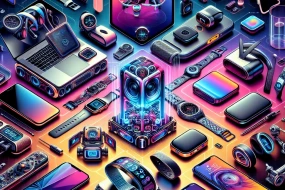
In the age of smartphones and social media, technology has become an inseparable part of our daily lives. While it brings us closer to people thousands of miles away, it also poses challenges to our personal relationships. As we navigate this digital landscape, understanding the impact of technology on our connections with others is crucial. This article delves into how technology influences personal relationships and offers practical advice on maintaining healthy connections in a digital world.
Balancing Connectivity and Disconnection
Technology makes it easier than ever to stay connected with loved ones, yet it can also create a paradoxical sense of disconnection. While texting and social media allow for instant communication, they often lack the depth and nuance of face-to-face interactions. Consider the difference between a text message and a heartfelt conversation over coffee; the former is convenient but often lacks the emotional richness of the latter. To maintain a healthy balance, prioritize real-world interactions and use technology as a supplement rather than a replacement.
The Double-Edged Sword of Social Media
Social media platforms like Facebook and Instagram can both strengthen and strain personal relationships. On one hand, they offer a way to share life events and maintain connections with distant friends and family. On the other hand, they can lead to misunderstandings and jealousy. For instance, seeing a friend's vacation photos might spark envy, or a misinterpreted post could lead to unnecessary conflict. To mitigate these issues, use social media mindfully: engage in positive interactions, avoid comparisons, and remember that online personas may not reflect real life.
The Impact of Instant Messaging on Communication
Instant messaging apps like WhatsApp and iMessage have revolutionized how we communicate, offering immediacy and convenience. However, they also pose challenges, such as the expectation of immediate responses, which can lead to anxiety and miscommunication. A common pitfall is over-reliance on text-based communication, which lacks vocal tone and body language, leading to potential misunderstandings. To improve communication, try to incorporate voice or video calls for more nuanced conversations and set boundaries around response times to reduce stress.
Navigating Online Dating and Relationships
Online dating has transformed the way people meet potential partners, offering a wider pool of options and the convenience of swiping from the comfort of home. However, it also presents challenges, such as the risk of superficial judgments based on profiles and photos. To foster meaningful connections, approach online dating with intention: take time to craft a genuine profile, engage in thoughtful conversations, and be open to meeting in person when safe and appropriate. Remember, genuine relationships require effort beyond the digital realm.
Technology's Role in Family Dynamics
Within families, technology can be both a unifying force and a source of tension. Video calls can bridge geographical distances, allowing grandparents to connect with grandchildren, while shared digital calendars can help coordinate busy schedules. However, excessive screen time can lead to family members feeling neglected. To foster healthy family dynamics, establish tech-free times or zones, such as during meals, to encourage face-to-face interactions and ensure that technology enhances rather than detracts from family life.
The Influence of Technology on Friendships
Friendships have been reshaped by technology, allowing for constant contact through group chats and social media. While these tools help maintain connections, they can also lead to superficial interactions. For instance, liking a friend's post is not a substitute for a personal conversation. To nurture meaningful friendships, make an effort to connect offline, whether through phone calls, meetups, or shared activities. Remember, quality often trumps quantity in relationships.
Managing Digital Boundaries
In a world where we are always 'on,' setting digital boundaries is crucial for maintaining healthy relationships. This includes managing notifications, setting limits on screen time, and being mindful of the impact of technology on mental health. A common mistake is allowing work emails and social media to intrude on personal time. To combat this, establish clear boundaries, such as designated tech-free times, and communicate these to loved ones to foster mutual respect and understanding.
Technology's Impact on Emotional Health
The constant connectivity afforded by technology can affect emotional health, influencing stress levels, sleep patterns, and overall well-being. The phenomenon of 'technoference,' where technology interrupts personal interactions, is a growing concern. To protect emotional health, practice digital detoxes, prioritize offline interactions, and engage in activities that promote mindfulness and relaxation. By being intentional about technology use, you can enhance personal relationships and overall well-being.
The Future of Relationships in a Digital World
As technology continues to evolve, so too will its impact on personal relationships. Emerging technologies like virtual reality and artificial intelligence offer new ways to connect but also pose new challenges. The key to thriving in this digital future is adaptability: being open to new tools while maintaining the core principles of empathy, communication, and genuine connection. By embracing technology thoughtfully, we can enrich our relationships and navigate the complexities of the digital age.































